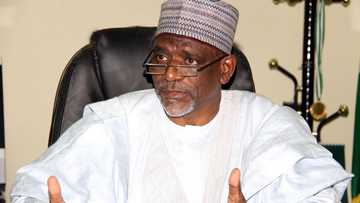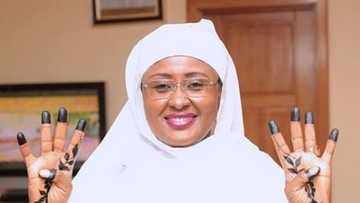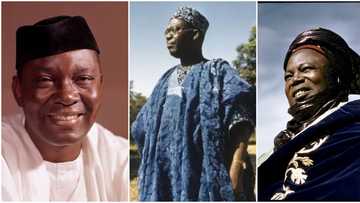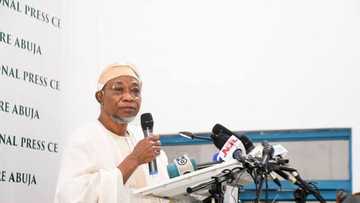62nd Independence Anniversary: 7 Interesting Nigerian Facts You Never Knew About
- What better way is to celebrate Nigeria's Independence day without exploring a bit of our interesting history
- Nigerians are termed the Giant of Africa as we have indeed survived through the odds and still stand stronger
- To celebrate this great nation today, Legit.ng compiled interesting facts about Nigeria as it witnessed its 62nd Independence anniversary
There is so much to learn about Nigeria, its people, and its cultures.
On October 1, Nigeria celebrates its Diamond Jubilee — marking 60 years since the country became an independent nation with the end of colonial rule.
With an estimated population of about 204 million people, Nigeria today is the most populous Black nation on Earth and the seventh most populous country in the world.
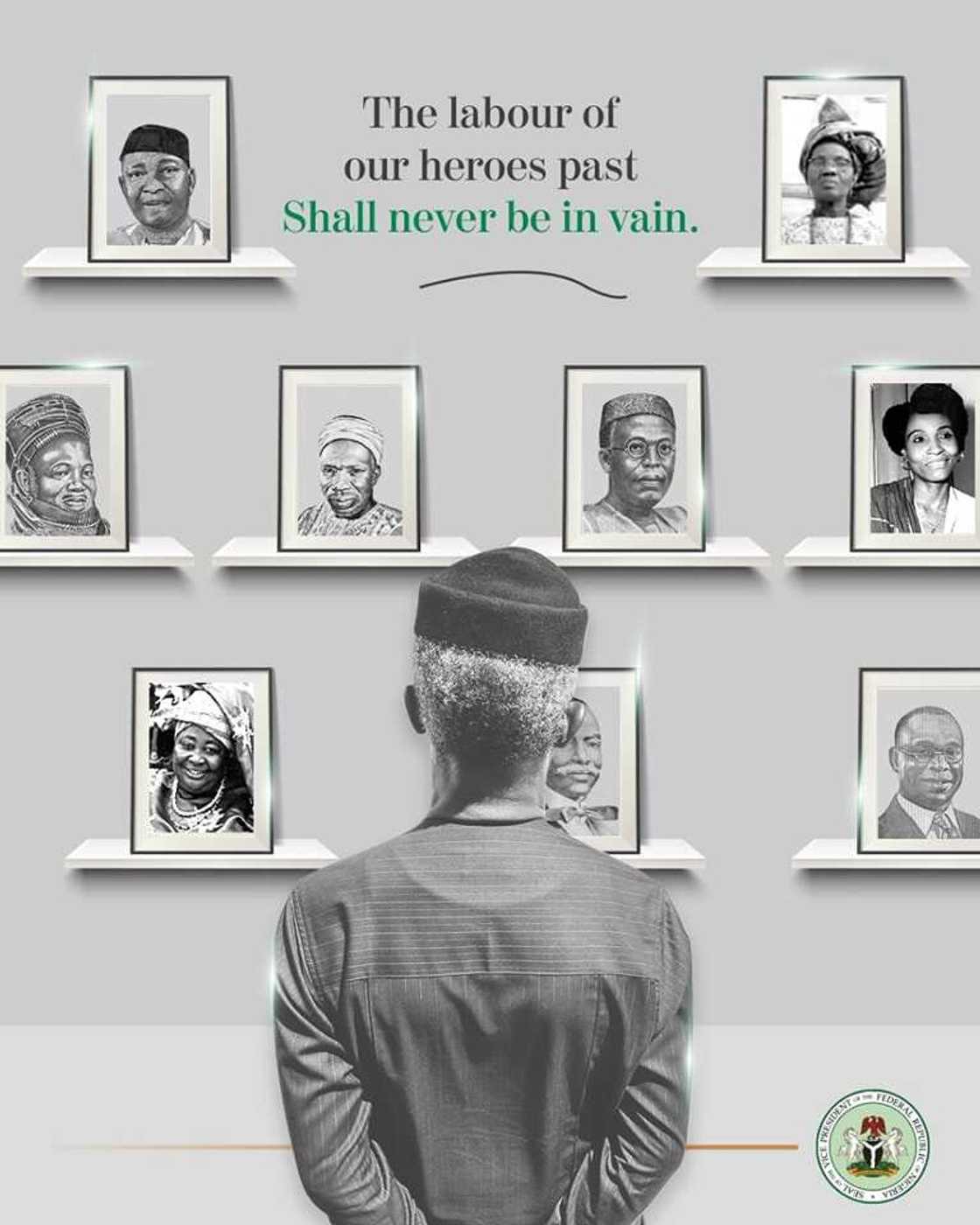
Source: Facebook
There is so much to learn about Nigeria, its people, and its cultures. With so much history and cultural richness, there are many lessons to be learned from Nigeria’s impact on the African continent and the world at large. Global Citizen celebrates the resilience and ingenuity of the Nigerian people on this historic and important day.
PAY ATTENTION: Share your outstanding story with our editors! Please reach us through info@corp.legit.ng!
1. The Name ‘Nigeria’
The name ‘Nigeria’ was coined by Flora Shaw. She was the wife of Lord Lugard – a British soldier who paved the way for Nigeria’s amalgamation and became the first Governor-General of Nigeria. Flora drew inspiration from the great river Niger and combined the words ‘Niger’ and ‘Area’ to form ‘Nigeria’.
2. Nigeria was formed in 1914
The land area known today as Nigeria was formed in 1914 when colonial authorities merged the Northern and Southern Protectorates of Nigeria, to form the amalgamated Protectorate and Colony of Nigeria.
This merger brought together over 400 ethnic groups and tribes into what was then the largest British colony in the world. The name “Nigeria” is also derived from colonial sources.
3. Nigerian Founding Fathers
It took a lot of passion, determination, and selflessness from many great Nigerians to make our independence day a reality in 1960. Here are just a few Nigerians who were instrumental to this cause:
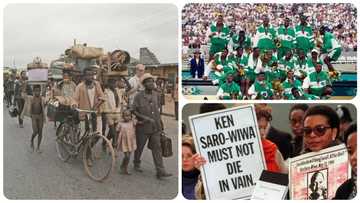
Read also
Nigeria's Independence: 11 photos from 6 decades showcasing historical events that can never be forgotten
Dr. Nnamdi Azikiwe – known as ‘Zik’, he was the first elected President of Nigeria after independence.
Obafemi Awolowo – he introduced free education in the Western region of Nigeria and also founded Action Group.
Sir Ahmadu Bello – founded the Northern People’s Party (NPP) in 1951 which later joined forces with Nnamdi Azikiwe’s NCNC party to fight for independence from the British.
4. Nigeria gained independence from colonial rule in 1960
Nigeria gained independence from the British empire in 1960, initially adopting a British style of government with Abubakar Tafawa Balewa as the first Nigerian head of government (prime minister). The country then had a population of over 45 million people.
5. Nigeria has been ruled by military leaders for a combined 29 years
On January 15, 1966, a group of young, idealistic, UK-trained army majors overthrew Nigeria's democratic government in a violent military coup — the country’s first.
A succession of increasingly repressive military governments ruled Nigeria for 29 of the next 33 years, until the restoration of democracy in 1999.
Some of the blowback effects of this coup include:
the secessionist Biafra movement;
It propelled a group of young military officers onto the national stage and they still wield enormous influence in Nigerian politics;
Corruption — the military decreed that all natural resources be controlled by the state, which has entrenched the do-or-die nature of Nigerian politics;
The army's politicised past means that Nigerians live with the (real or imagined) fear that a coup is a possible outcome of any political crisis.
6. The Nigerian civil war started in 1967
In 1967, following two coups and turmoil that led to about a million Igbos (one of Nigeria’s most-populous ethnic groups primarily from the Eastern region of the country) returning to the south-east of Nigeria, the Republic of Biafra seceded.
The Nigerian government declared war and after 30 months of fighting, Biafra surrendered. On January 15, 1970, the conflict officially ended.
7. The military dictatorship in Nigeria ended in 1977
Even then, it resulted from two years of near anarchy, first with the 1975 coup that brought down the Gowon regime. A trio of generals took power, specifically, Murtala Muhammed, Olusegun Obasanjo, and Theophilus Danjuma.
Another coup took place in 1976, led by Colonel Buka Dimka, killing General Muhammed, but ultimately failing and forcing the rogue colonel into exile.
General Shehu Yar’adua replaced General Muhammed, and in 1977, the junta organized a constituent assembly to draft a new constitution. This led to elections in 1979, with Shehu Shagari becoming the first president of the Second Nigerian Republic.
Conclusion
Nigeria's 62nd Independence is here, wait; we are not where we are but we are heading to the promise land and we will surely get there.
Nigerians react
Nigerians took to the Facebook page of Legit.ng and shared their views on the facts listed above.
Ifeanyi Obuaku wrote:
"Our founding fathers failed."
DC King stated:
"Our white in black skin leaders I hail oh, we are still waiting to be emancipated ."
Ojonuba Sting Macho noted:
"How can d president foolishly be praising the CBN Governor who did nothing in office....so annoying."
Philip John maintained:
"Nigerians forget so easily, nothing to celebrate under this APC Government only heartless people will wish happy independent day, Me I say Sad independent day."
Blossom Feelz said:
"Happy independence day to Nigeria."
FG declares holiday to mark Independence Day
Meanwhile, Legit.ng reported that the federal government on Wednesday, September 28, declared Monday, October 3, a public holiday.
The holiday, according to Ogbeni Rauf Aregbesola, the minister of interior, is to mark the nation’s Independence anniversary.
Aregbesola also used the opportunity to assure Nigerians of the government’s commitment to tackling all the challenges facing the nation.
Mike Ozekhome speaks on what will end Nigeria's problems, claims Peter Obi, Atiku, Tinubu cannot
A senior advocate of Nigeria has said that Nigeria's problems are enormous for the three leading presidential candidates contesting for the seat of the president in the 2023 election to profer solutions for them
Mike Ozekhome warned the insecurity situation, bad economy, and hopelessness which has ravaged the country can only be addressed through restructuring of the nation.
Speaking while delivering his 62nd Independence Day speech, the senior lawyer said that it is only a change in the system of government that can bring a turnaround for Nigeria.
Source: Legit.ng

